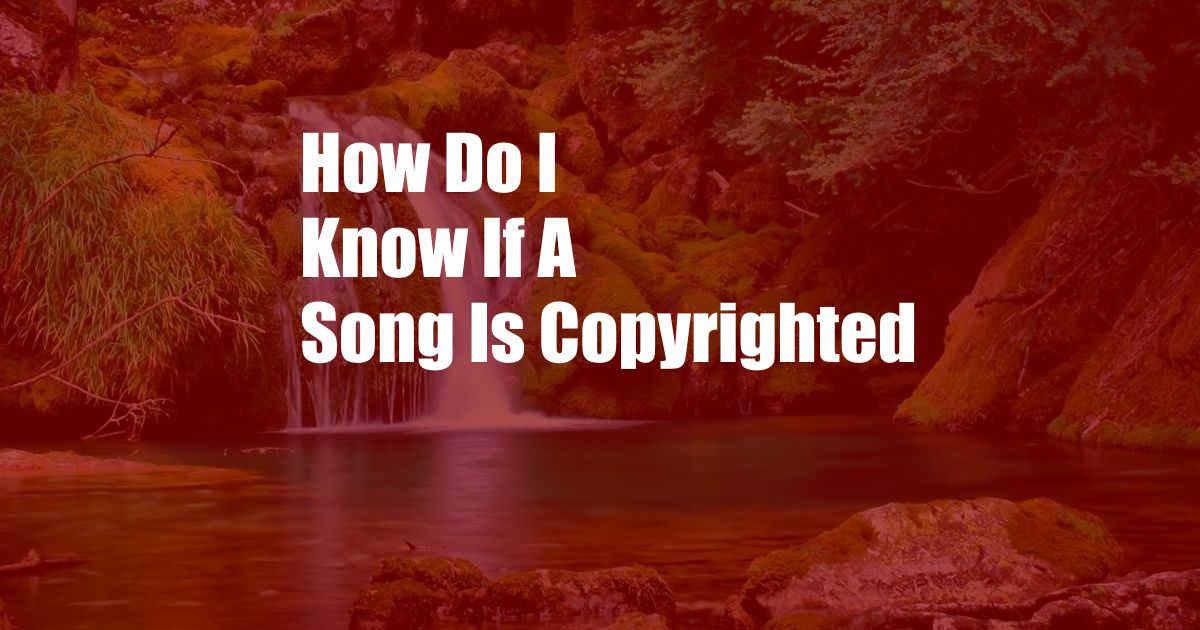
How Do I Know If a Song Is Copyrighted?
In this digital age, music is more accessible than ever, with countless songs available at our fingertips. However, the proliferation of music has raised important questions regarding copyright and ownership. As an avid listener, I’ve often wondered how to determine whether a song is copyrighted. To clarify this matter, let’s delve into the nuances of copyright law and explore the various ways to ascertain the copyright status of a musical composition.
The Legal Landscape of Copyright
Copyright is a legal protection granted to creators of original works, including songs. It gives exclusive rights to the copyright holder to control the distribution, reproduction, and use of their creation. In essence, copyright serves as a barrier, shielding the artistic expression of creators from unauthorized exploitation.
Identifying Copyright Ownership
1. Search the Copyright Office Database
The United States Copyright Office maintains a vast database of copyrighted works. You can conduct a search using the song title, artist name, or other identifying information to determine if the song is registered with the copyright office. A successful search will provide details about the copyright holder, registration date, and other relevant information.
2. Check the Song’s Metadata
Many digital music platforms, such as Spotify and Apple Music, display metadata associated with each song. This metadata often includes copyright information, including the name of the copyright holder and the copyright year. However, it’s important to note that not all platforms provide this information, and it may not always be accurate.
3. Contact the Songwriter or Publisher
If you’re unable to find copyright information through online databases or metadata, you can directly contact the songwriter or publisher of the song. They can provide you with the necessary details and confirm the copyright status of the composition.
4. Look for Copyright Notices
In some cases, copyright holders may include copyright notices on physical copies of music or within the song’s digital files. These notices typically include the copyright symbol (©), the year of publication, and the name of the copyright holder.
5. Consider Public Domain
Songs that have entered the public domain are no longer protected by copyright and can be freely used without permission. In the United States, songs published before 1923 are generally considered to be in the public domain. However, it’s important to verify the copyright status through reliable sources, as there may be exceptions or specific restrictions.
Expert Tips and Advice
1. Exercise Due Diligence
Always assume that a song is copyrighted unless you have explicit evidence to the contrary. It’s essential to exercise due diligence to avoid potential copyright violations that can result in legal consequences.
2. Seek Legal Counsel if Necessary
If you’re unsure about the copyright status of a song or have specific legal questions, it’s advisable to seek guidance from an experienced legal professional. They can assess the situation and provide tailored advice based on your specific circumstances.
Frequently Asked Questions (FAQs)
- Q: Can I use copyrighted music in my own videos or content?
- A: No, you cannot use copyrighted music without explicit permission from the copyright holder. Doing so may result in copyright infringement.
- Q: How long does copyright protection last?
- A: The duration of copyright protection varies depending on the jurisdiction and the date of publication. In the United States, copyright protection generally lasts for the life of the author plus 70 years.
- Q: What are the penalties for copyright infringement?
- A: Copyright infringement can result in severe penalties, including fines, imprisonment, and injunctions against further use of the copyrighted material.
Conclusion
Knowing how to determine whether a song is copyrighted is crucial to protect both creators and those who use music in their own works. By understanding the legal landscape of copyright and employing the various methods outlined in this article, you can ensure that you are using music in a legally compliant and respectful manner. Remember, respecting the intellectual property rights of creators is essential for a vibrant and thriving music ecosystem.
Are you interested in learning more about copyright law and its implications for music? Share your thoughts and questions in the comments below, and let’s continue the discussion!